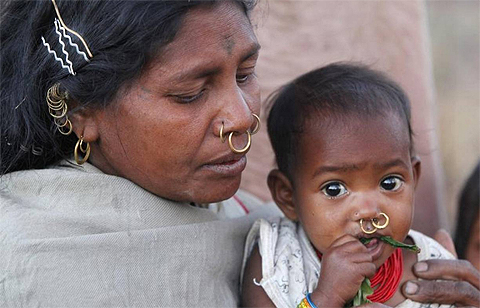 ARCHIVE PHOTO: Members of the Dongria Kondh tribe gather on top of the Niyamgiri mountain, which they worship as their living god, to protest against plans by Vedanta Resources to mine bauxite from that mountain near Lanjigarh in India's Orissa state February 21, 2010. REUTERS
ARCHIVE PHOTO: Members of the Dongria Kondh tribe gather on top of the Niyamgiri mountain, which they worship as their living god, to protest against plans by Vedanta Resources to mine bauxite from that mountain near Lanjigarh in India's Orissa state February 21, 2010. REUTERSMUMBAI: India's indigenous children are far more likely to die or suffer from malnutrition than those from other communities, according to the first government study on health among tribal groups. Among indigenous communities, 57 out of every 1,000 children die before age five, compared to 37 deaths in other social groups, according to the report released last week.
The national average for malnutrition among children is 35 percent, while researchers found that 42 percent of indigenous children are underweight. Researchers examined health conditions for India's 104 million indigenous people, and called for resources to be directed specifically towards improving healthcare and food security among the country's 705 tribal groups.
"Most states do not have funding for tribal health, nor is there any separate account of how money (from the health budget) has been spent on them," said Abhay Bang, a physician and public health expert who headed the research. The government should allocate 8.6 percent of its annual budget for improving conditions among tribal people who account the same percentage of India's population, the report recommended.
The researchers pointed to a number of challenges that indigenous people have in accessing healthcare and adequate food. Almost 90 percent of the country's tribal people live in rural areas, which are often in rugged and remote regions where doctors are reluctant to serve, the researchers said. Many communities have been "robbed" of food, shelter and livelihoods due to "deforestation and forest laws that limit access to forest produce," according to the report. Campaigners have called for better protection for tribal lands.
"These are traditional and free sources of food, but they have depleted," said Milind Thatte, founder of Vayam, a charity that works on tribal development. "Conserving these resources and giving tribals rights over them will go a long way in improving their health," he told the Thomson Reuters Foundation. Tribal homelands have been eroded over the past few decades with the development of mines and major infrastructure projects say campaigners.
Floods and famines have also taken a heavy toll on indigenous communities, forcing many to migrate, the report pointed out. Migration often undermines nutrition among children, because they are deprived of the free meals provided by the government in schools and daycare centers in their home villages, the researchers found. About 146,000 children from tribal communities die each year, according to the report, which cited a study from 2011, the last year that data was available. - Reuters









